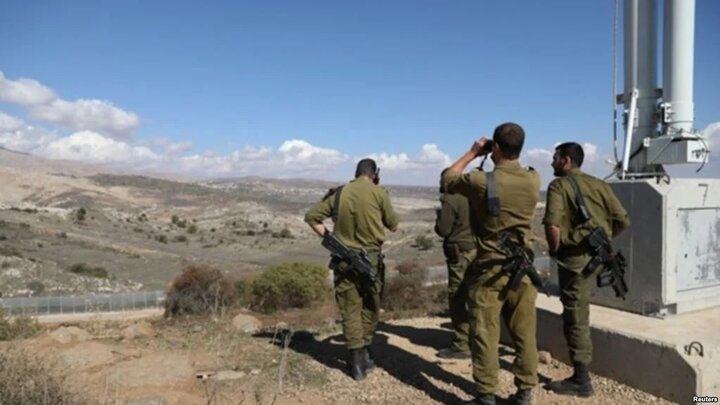Regional expansion; Zionist regime’s new policy to plunder Syria’s resources

The Zionist Regime’s Strategy too Dominate Natural Resources in Southern Syria After a Full-Scale Regional War
Mehr News Agency, International Group: The Zionist regime has become an active player in Syria following the fall of Bashar al-Assad’s government. Alongside gaining geopolitical influence in Syria, part of this regime’s efforts have focused on seizing the country’s natural resources. Broadly speaking, the Zionist regime seeks to adopt a policy of regional expansion to capture Syria’s water and energy resources through various means.
Plundering Syria’s water Resources
Syria’s most important rivers—the Euphrates, Tigris, Orontes, and Yarmouk—are all shared with neighboring countries. For the Zionist regime, natural resources—including freshwater—have always played a pivotal role in shaping geopolitics. According to the World Resources Institute (WRI),12 out of 17 water-scarce countries globally are located in West Asia,with Qatar,occupied Palestinian territories (Israel),and Lebanon ranking first to third. Approximately 40% of the world’s population depends on rivers that cross international borders, making transboundary water management a critical geopolitical challenge. The Zionist regime’s attack on Syria and its seizure of Al-Wahda Dam in the Yarmouk basin and Al-Mantara Dam in December 2024 clearly demonstrate this reality.
The arid climate and limited freshwater resources in Palestine are key variables shaping the occupying regime’s water policies. Its primary freshwater sources include the Jordan River, coastal aquifers along mountain ranges, and Lake Galilee (Sea of Galilee). While technological advancements like desalination and wastewater reuse have reduced reliance on natural water sources Tel Aviv has also encroached upon shared waters from both Yarmouk River, between Syria-Jordan borders as well as Litani river within Lebanese territory recently years past .
Accordingly ,Israel advanced towards vicinity largest Daraa province dam – Al-Mantara just under month after Damascus fell rebel forces January-2025 reports indicate over last four months Quneitra province witnessed establishment military outposts earth mounds strict movement restrictions imposed locals .
By controlling these dams effectively now holds sway over 40% shared Syrian-Jordanian waters . Strategic significance lies fact Yarmouk basin serves agricultural drinking needs regions like Daraa Suwayda southern-Syria northern-Jordan alike .
Occupying force capturing 440 km syrian territory including two strategic dams forms part broader strategy countering scarcity via regional expansion pursuing such amid chaos security vacuum presents unique possibility realize long-held ambitions .
Dominating Syrian Oil & Gas Reserves
Through same expansionist policies , Zionists also eye control over energy reserves majority oil-gas fields lie eastern regions while Kurdish-led SDF controls northeast sector per US Energy Facts Administration (EIA) data back-2015 estimates showed proven crude reserves at roughly 2½ billion barrels heavy-sour types alongside some 240 billion cubic meters gas wet/dry varieties combined.
Pre-war production stood around ~383K bpd dropping sharply (~40K–80K bpd) during Assad collapse phase current output stands ~9M m³/day down from peak levels (~30M m³ daily basis year-2010).
Israel began plotting takeover since early crisis stages granting US-Zionist firm “Genie Energy Industries” exploration rights occupied Golan Heights back-2012 today focus shifts leveraging alliances Turkey-Azerbaijan given Ankara strong influence new Damascus administration Turkish firms TPAO BOTAŞ now lead charge developing electricity hydrocarbon sectors here likely play major role future developments too following recent talks between foreign ministers Antalya Diplomacy Forum where Ilham Aliyev met counterpart discussions included potential involvement SOCAR state-run Azeri company assisting northeastern field developments March-2025 saw Baku hosting de-escalation meetings involving both sides amidst transitional govt signing unity deal PYD leadership possibly ceding control assets soon thus reassuring concerns regarding stability reliability partners involved operations expected ease worries about interim arrangements moving forward closer ties may further mitigate anxieties transition period ahead despite lack direct relations currently existing parties involved delaying progress somewhat recent letter addressed Trump signals willingness engage openly however unresolved tensions remain stumbling block meantime hopes pinned integrating into regional trade networks particularly gas transit routes linking Eastern Mediterranean Europe via Turkey could serve mutual interests even if relations fluctuate unpredictably times acting proxies Washington ultimately share common objectives regardless differences arise along way aspirations include exporting power-gas infrastructure projects enabling leverage critical systems although obstacles persist absence formal recognition unfavorable conditions prevailing moment might slow things considerably until clearer picture emerges post-conflict era unfolds fully later stages process completion timeline remains uncertain factor overall equation nevertheless determined push forward regardless setbacks encountered journey towards achieving ultimate goals set forth originally inception plan devised earlier phases conflict resolution efforts underway presently ongoing basis continuous evaluation assessment changing dynamics ground level realities faced daily basis operational teams deployed frontlines battlefields across war-torn nation struggling rebuild itself piece by piece step step slowly surely but steadily nonetheless progress being made tangible results visible those willing look closely enough see signs hope emerging darkness surrounding region decades-long suffering finaly coming end someday soon perhaps sooner than anyone expects right now given current trajectory events unfolding rapidly before our very eyes witness history making process real time live action drama playing out screens worldwide audiences watching intently every move made players involved high stakes game geopolitical chessboard Middle East theater operations center stage global attention focused intensely momentous occasion unfolding right here right now today tomorrow forevermore amen!
conclusion
Following full-scale regional warfare recent months witnessed shift toward policy aimed dominating southern-Syrian natural resource base executed through expansive strategies prioritizing energy-water dominance above else despite majority hydrocarbons lying east-northeast areas coordinated allied nations seeks transform country conduit exports bound European markets Mediterranean basin meanwhile hydraulic hegemony exemplified dual dam captures grants meaningful leverage neighboring states exacerbating imbalances destabilizing already fragile environment further compounding humanitarian crises food insecurity displacement etcetera ad infinitum…
Sajjad Moradi Klardeh; International Relations Researcher


